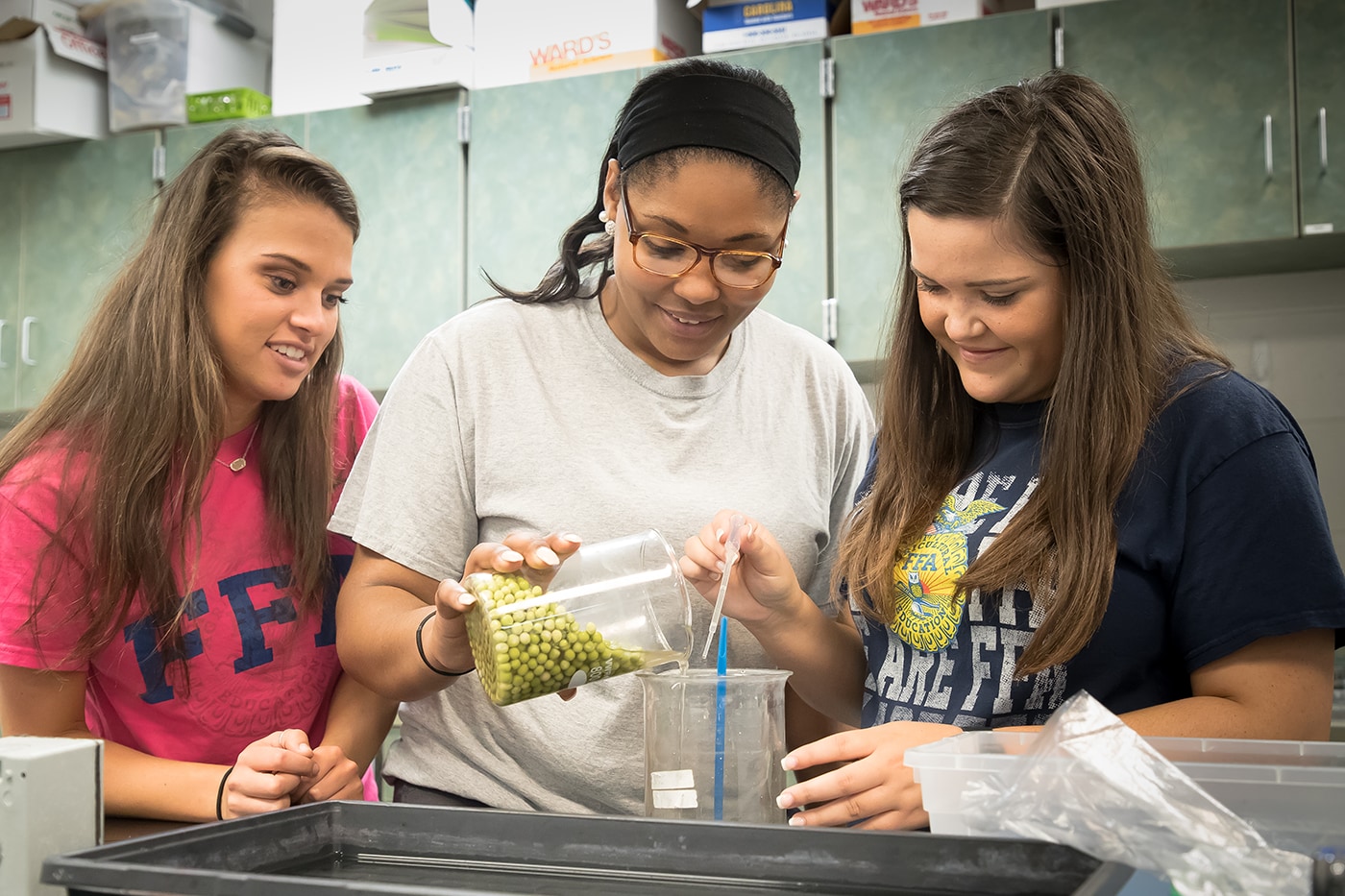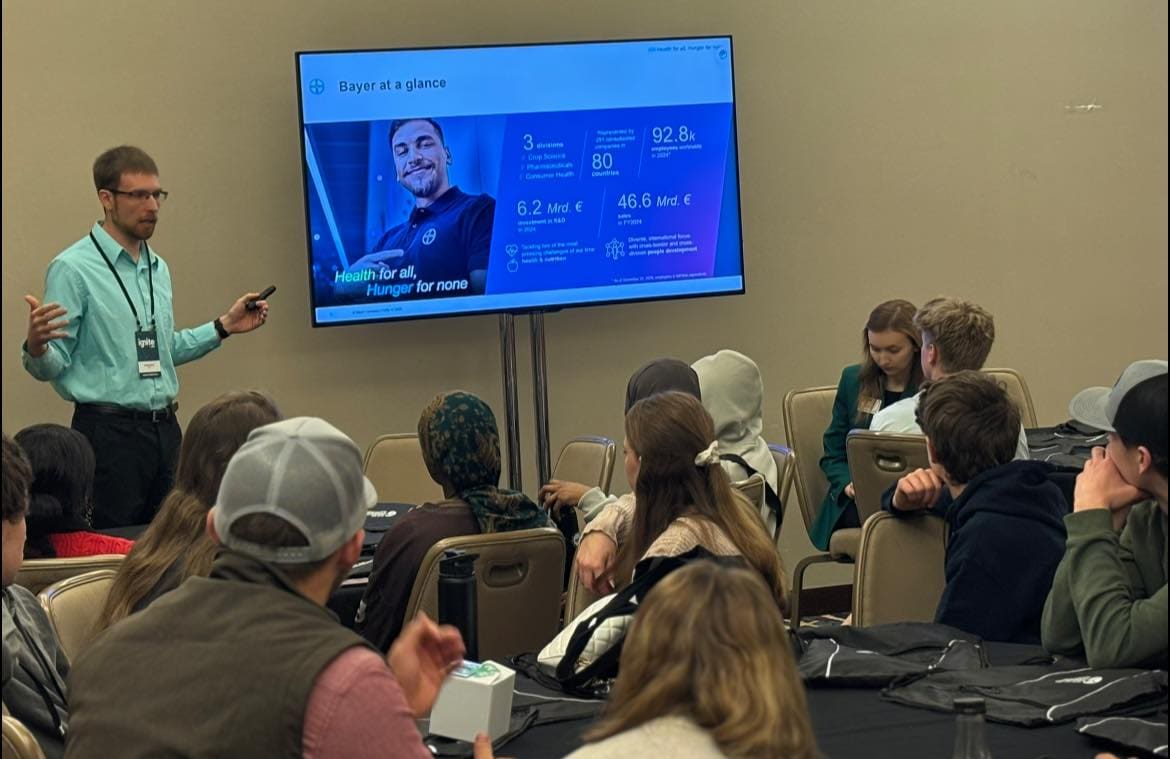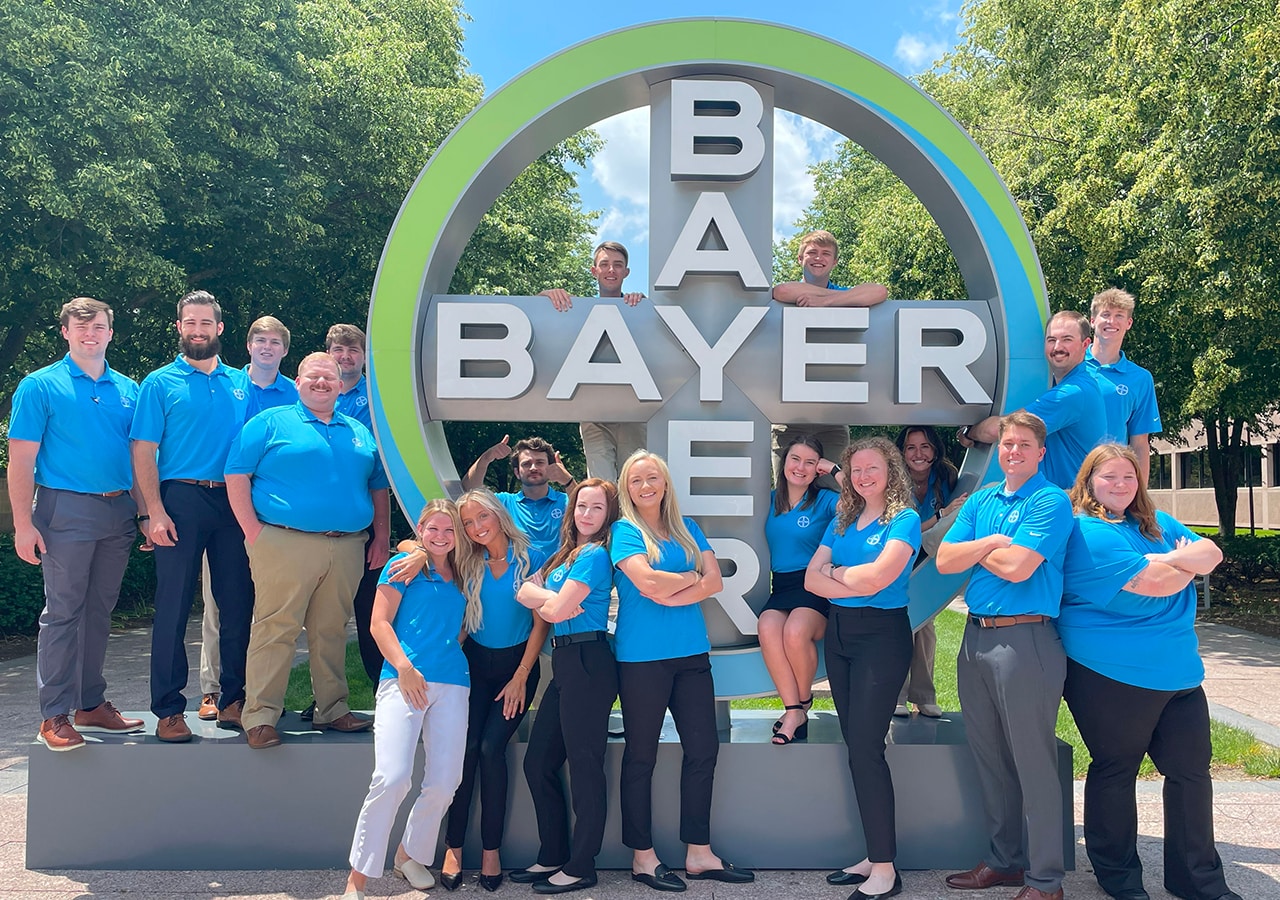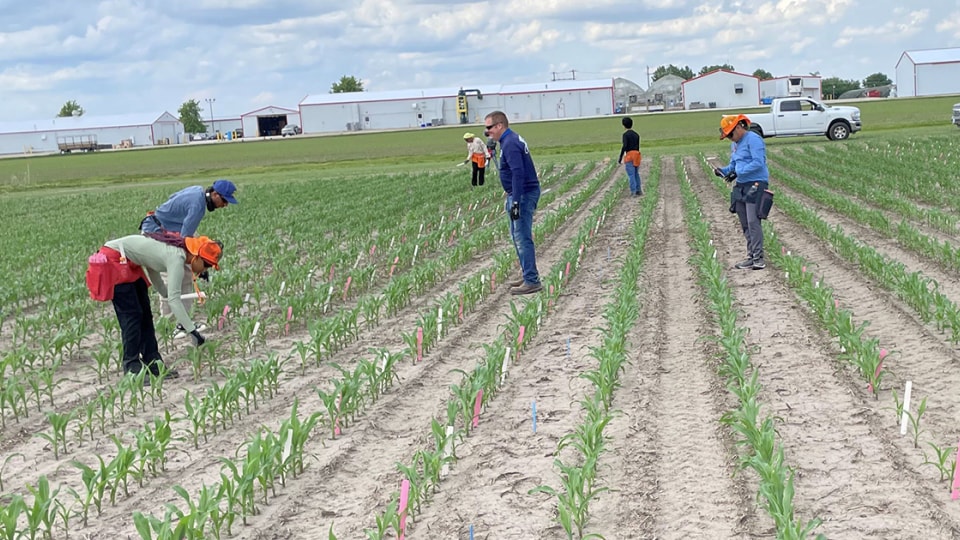The Lasting Value of Investing in Youth Development

- This Is Bayer
- Agriculture
- Consumer Health
- Pharmaceuticals
- Products
- Community
- News & Stories
- Careers
- This Is Bayer
- Agriculture
- Consumer Health
- Pharmaceuticals
- Products
- Community
- News & Stories
- Careers
Communities thrive when their young people succeed. Our collective future depends on the ability of today’s youth to imagine and actualize paths forward that contribute to the well-being of our communities and our world. As such, Bayer’s investment into youth programs like FFA and 4-H focuses on providing youth with the knowledge and tools that its own employees use to succeed in today’s skills-driven marketplace.
It happens in the blink of an eye. Our young people grow up. But lasting a lifetime are the impacts of their youth interactions, which guide them toward the path they will follow.
As the world evolves to meet today’s challenges, those paths are becoming more dynamic and complex. Helping young people navigate that complexity is important to Bayer, and investing in the success of youth is a key reason Bayer partners with and sponsors organizations like FFA and 4-H.

Bayer is proud of its decades-long history of support for youth organizations like FFA and 4-H. Beyond sponsorships, many Bayer employees engage with the organizations providing mentorship and knowledge, as well as practical applications for using academic learnings and skills in real-world settings.
Preparing Students for the Jobs of the Future

Given the pace of modern technology, it’s not surprising that many of the jobs of the future haven’t been created, or even thought of, yet. This shows that the next generation of workers will have to be flexible and focus on developing their skills and adapting them to new situations.
“We are experiencing a shift in how we work and at the same time, new generations entering the workforce have different and unique ideas around their preferred work environments,” said Aly White, Emerging Talent Lead. “This is why it is so important to interact with youth while they are in school, so they can better understand how companies are preparing for the future and how they can fit into that. It also helps us uncover valuable insights about how we need to evolve to meet the changing needs of our future workforce.”
As companies become more complex so does the science that is used to create new innovations. Outside of skills development, Bayer is also helping to get the latest scientific information into the classroom.
Santiago Navarro, Bayer Molecular Cell Sciences-Technology Innovation, understands first-hand how sophisticated the agriculture industry has become. In his current position, he looks at the molecular behavior of cells from different crops, weeds, fungi, and insects, and develops cellular imaging and assays that can be used to accelerate the development of crop science technologies for farmers.
“Part of the fun for me is problem-solving and figuring out how things work,” Santiago said. It’s a passion that he enjoys sharing with others, so he jumped at the chance to be involved in a recent curriculum development project for ag teachers being sponsored by FFA.
As an expert in plant biotechnology, he was asked to review the modules of Case 4 Learning curriculum, as part of a three-year project funded by FFA to ensure that the curriculum used by agriculture education teachers is up-to-date with industry practices.
“For example, they had a lot of material in the coursework about whether it’s ethical to do biotechnology,” Santiago explained. “That’s absolutely important, but to add to that, let’s help students understand the processes and technologies that we use to assess safety.”
“It's important for Bayer to support youth organizations, but our real value is in what we can provide as an industry leader with cutting-edge science in areas like AI, automation, molecular biology, and synthetic chemistry,” Santiago said. “The technologies that we are launching will keep American farms productive for generations to come, and we need to ensure students will one day have a role that critical effort.”
The training materials that Santiago is helping to develop will be tested with actual ag teachers in the classroom for final tweaks before being rolled out to students across the country. The materials will include lecture, laboratory, and other hands-on components. FFA partners like Bayer also provide additional opportunities to support teachers, such as virtual or in-person tours to give students an opportunity to interact with scientists and gain perspective on the many roles in agriculture.
“It is very important for FFA to partner with companies like Bayer for current industry trends, career advice and internships, mentorships, and support of agricultural education materials and programs to stay relevant and ensure career success for all of our members,” said Molly Ball, President of the National FFA Foundation.
‘Beyond Ready’: Empowering Youth to Thrive
The rapid pace of technology means that students also need to be adept at softer skills like analytical thinking, creativity, resilience, flexibility, and adaptability.
That is why, as a 4-H sponsor and partner, Bayer participates annually in the Ignite By 4-H event, and in March 2025, Bayer hosted, among other opportunities, a workshop for students entitled, “Skills Over Titles: Embracing the Future of Work.” The team gave the teens a glimpse into how companies like Bayer are flowing talent through the organization to create innovation more quickly.
“To thrive in these new ways of working, young people need to intentionally and continuously develop their skills and be open to many new experiences and opportunities,” Aly said.

In the session at Ignite, Aly and other Bayer leaders showed students how to think differently about their skills. “For example, since we no longer rely on managers at Bayer as our primary source of feedback and coaching, it is important for incoming talent to get comfortable with peer feedback and coaching. They need to understand how to market, develop, and deploy their specific skillset, while collaborating within and across teams in a very fluid and dynamic environment.
4-H just recently launched its “Beyond Ready” campaign, focusing their efforts on equipping young people with the skills, resilience, and confidence they need to thrive in an ever-changing world. As technology advances and companies become more complex, having the technical skills and soft skills to navigate to success becomes even more critical.
“4-H is already preparing 6 million youth that are 2x more likely to go on to careers in STEM, be leaders and live life with purpose, but we need more young people with those outcomes to fill an ag pipeline that has twice as many jobs as qualified candidates, according to an employment outlook report from USDA and Purdue University,” said Heather Elliott, Chief Development & Marketing Officer, National 4-H Council.
Being prepared and ready for the workforce is essential for getting a good footing and having success early on. Young people who can flex into new organizational structures and ways of working will have a better chance of attaining their career goals early on, Aly said. “It’s these softer skills that round out a student’s resume when we are hiring and developing our future leaders at Bayer. 4-H understands the need to equip students for success with a focus on real-world skills to help them be Beyond Ready to conquer the world’s challenges and shape the future of their towns and communities.”
Preparing today’s youth to be “Beyond Ready” is made possible through meaningful partnerships with organizations like Bayer, noted Jill Bramble, President and CEO, National 4-H Council. “[Bayer’s] commitment to youth skill-building and career readiness helps us turn research into real-world impact. Together, we’re empowering young people with the tools, mentorship, and experiences they need to lead and succeed in a rapidly changing world.”
The Cycle of Student to Employee

The cycle from student to employee is so quick that forming a positive connection to Bayer through our support of youth organizations doesn’t take long to pay off in terms of attracting talent to the company, as well as ensuring that many of the company’s future customers and partners have fond memories of Bayer’s interactions with them in their youth.
“As someone whose experience in 4-H and FFA was pivotal in my career path, I can personally attest to the value of youth organizations for expanding access to life-changing opportunities for students who might not otherwise have those resources in the communities where they live,” said Tami Craig Schilling, Bayer FFA Executive Sponsor. “It is these young people who form the very backbone and future of our communities.”
Jaci Limestall, Bayer U.S. Digital Farming Solutions, is a perfect case in point. Once a high school FFA member, Jaci now volunteers to provide lesson plans in ag sales for another FFA curriculum offering: the AgExplorer program.
And in addition to his work on FFA curriculum development, Santiago has helped to host a Bayer 4-H Day Camp for middle school students to explore STEM and agriculture careers. He has provided mentoring through B4U, the Bayer University Mentoring Program, and he works with Juntos 4-H, which engages Latino youth toward careers in science and STEM.
“I had a great mentor, a very passionate scientist who kept asking questions and motivated me to go to graduate school,” Santiago explained. “He saw in me an aptitude for science that I didn’t see in myself. As a Science Fellow at Bayer, one of my responsibilities should be to advocate and educate the next generation of scientists. At the end of the day, everyone needs a coach, a mentor, an advocate – someone to open networks and opportunities and to give you a breadth of perspective that you don’t have.”
That sharing of expertise is at the heart of another youth initiative at Bayer. Through Bayer’s participation in the F.A.R.M. (Fostering Ag Resilience through Mentorship) program, our Ph.D.-level scientists are teaching young apprentices to collect phenotype data in the field.
“Bayer is proud to be a part of providing critical training and resources that students need as they navigate today’s skills-driven marketplace,” Beth said. “Bayer’s involvement in youth organizations goes far beyond funding afterschool programs; it’s about giving back to the communities where we live and work by preparing young people for success. When our youth thrive, we also strengthen our communities and better prepare them for the opportunities and challenges that lie ahead.”














